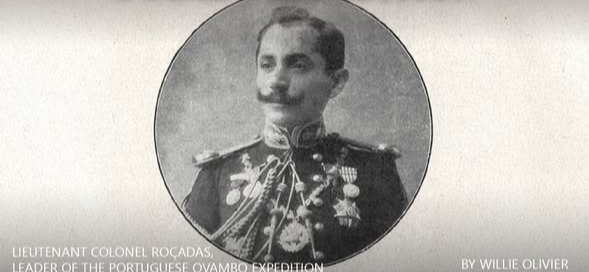At the end of the rinderpest epidemic the post was used to prevent the smuggling of arms and ammunition, the illegal trade in liquor and the movement of people in and out of Owambo. It also served as a control post for contract labourers until the main road to Owambo was rerouted through Oshivelo in 1964. Returning contract workers were routinely subjected to insults, harassment and searches. Goods such as “scented soaps, perfumes, small radios and good-looking women’s clothes” were often “confiscated” as they were considered inappropriate within traditional Owambo culture by the officials. When the Assistant Native Commissioner ignored a petition drawn up by Eliaser Tuhadeleni, also known as Kaxumba kaNdola, in January 1954, Tuhadeleni called a public meeting to which church leaders were invited. An Anglican priest, Theophilus Hamutumbangela, collected further evidence and petitioned the United Nations in October 1954.
Reverend Theophilus Hamutumbangela was a fearless and outspoken Anglican cleric who dedicated his life to fighting the injustices of apartheid. Born on 6 February 1917, he completed his schooling at St Mary’s School at Odibo in 1934 and became a teacher at the school four years later.
He attended a theological seminary in South Africa’s Eastern Cape province and was ordained as a deacon in 1946 and as a priest in 1947. When he became aware of the inhumane treatment returning contract workers were subjected to at Namutoni, Reverend Hamutumbangela wrote a petition to the Assistant Native Commissioner in January 1954 and petitioned the United Nations in October 1954. In the petition, he appealed for South West Africa to be placed under the trusteeship of the United Nations and for “… Canada to administer South West Africa for the United Nations.” The South African authorities deported him to Windhoek where he continued his political activism before he was taken back to Odibo in 1958. Reverend Hamutumbangela was arrested in the aftermath of the Old Location Uprising, imprisoned and placed under house arrest and was again arrested and imprisoned after Omugulugwombashe. During his time in prison he was poisoned which left him paralysed.
He died on 28 November 1990 and has been honoured with a statue of him holding a Bible under his left arm in Windhoek’s Parliament Gardens.



.jpg)
.jpg)




.png)

SUBMIT YOUR COMMENT